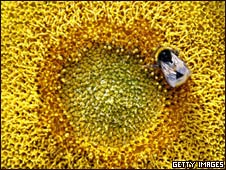Hay Fever 花粉过敏症
收听与下载
The UK has been enjoying some lovely summer weather recently. Brits have been making the most of the sunny spell by flocking to the beach and having barbeques in their gardens.
But there is often an unwelcome accompaniment to the sounds of sizzling sausages on the barbeque and buzzing bees in the flowers. The clamour of sneezing and people blowing their noses makes an unpleasant soundtrack to Britain's best summer weather. What is going on?

Summer means sun, bees and... hay fever for some
It is hay fever, an allergic reaction to pollen from trees, grass and other plants. When the pollens come into contact with the tissue inside the nose, they start an immune reaction that causes sneezing, itching and a runny nose.
Between 15 and 20% of people in the UK are thought to be affected by hay fever, with the numbers being even higher among teenagers.
Allergy specialist Professor Stephen Durham has calculated that the number of sufferers has doubled over the last twenty years. What is causing the rise?
"There's some evidence that pollution exacerbates it," he says. "And you've also got the hygiene hypothesis - that our bodies aren't as strong because we aren't exposed to infections when we are small children that our systems rebel against."
There is interesting evidence from Austria to suggest that hay fever is related to living in an increasingly sanitised environment.
Researchers there found that young children in regular contact with farm animals are less likely to develop allergies later on. Children living on farms were found to be three times less sensitive to hay fever and nearly four times less likely to suffer from asthma than those living in a non-rural environment.
Perhaps the worst news for hay fever sufferers is that their ailment can never be cured completely. So perhaps it's time we got used to a... a... a... achoo!
Glossary 词汇表 (收听发音, 请单击英语单词)
- sunny spell持续有阳光的天气
- flocking成群结队
- accompaniment伴随物
- sizzling咝咝响的
- buzzing嗡嗡响的
- clamour喧闹
- blow one's nose擤鼻子
- allergic过敏的
- pollen花粉
- tissue(人、动植物的)组织
- immune reaction免疫反应
- itching瘙痒的
- runny nose流鼻涕
- exacerbate加重、恶化
- hypothesis假设
- be exposed to infections与感染接触
- sanitised清洁的
- asthma哮喘
- non-rural非农村的
- ailment小疾病